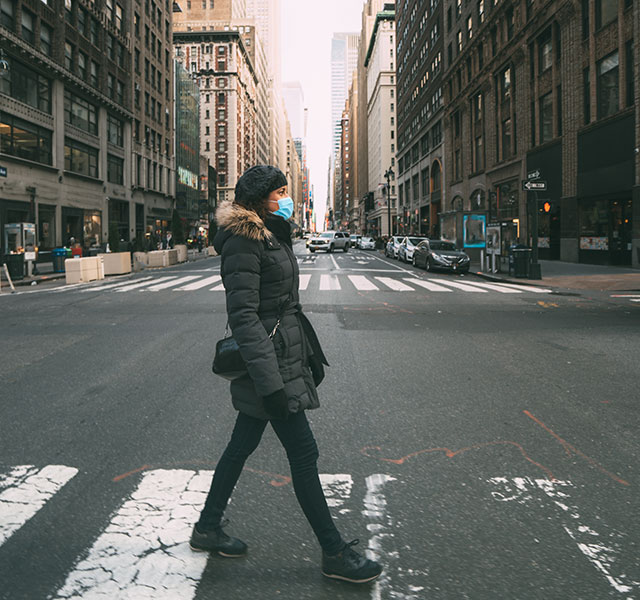While COVID-19 and influenza (the flu) share certain symptoms—fever, cough and nausea, for example—they are different viruses and they behave differently in the body. COVID-19 seems to spread more easily and leads to a more serious illness than the flu.
As doctors and scientists have learned since the beginning of the pandemic, wearing face masks, washing your hands frequently and social distancing can greatly help reduce the spread of this respiratory virus. But why is COVID-19 more contagious than the flu?
Here, Odaliz Abreu Lanfranco, MD, an infectious disease specialist with Henry Ford Health, shares the key factors.
Small COVID-19 particles may linger in the air longer than the flu.
COVID-19 mostly spreads from person to person through respiratory droplets that are released when you breathe, talk, cough or sneeze. These droplets can be inhaled or land in your nose or mouth. But COVID-19 particles that are smaller than these droplets can linger in the air for minutes to hours, making airborne transmission possible.
"This means that the virus could infect you even if you are farther than 6 feet away from someone who has COVID-19," says Dr. Abreu Lanfranco. "You could unknowingly be exposed to COVID-19 and contract the virus—even if the person who left those COVID-19 particles in the air is out of sight."
That’s why having proper ventilation is important: it can dissipate some of the coronavirus. (It’s also why having outdoor socially distant gatherings is safer than having them indoors, where air quickly becomes stale and doesn’t move as frequently.)
“It’s also one of the reasons why wearing a mask is important,” says Dr. Abreu Lanfranco. “If everyone wears a mask, the chances of COVID-19 particles intermingling in the air decreases, too.”
The incubation period for COVID-19 is longer than the flu.
“An incubation period is the time it takes between contracting a virus and experiencing symptoms,” says Dr. Abreu Lanfranco. “For COVID-19, the incubation period is 2 to 14 days, while for the flu, it’s on average 1 to 4 days. The discrepancy between these incubation periods is because of how each virus attaches itself to the cells.”
Because the flu has a shorter incubation period, you’ll experience symptoms more quickly and you’ll know to stay away from others to avoid spreading the illness. But you could potentially be exposed to COVID-19 and develop symptoms for up to 2 weeks. A large number of people could spread COVID-19 even before developing symptoms, as this 2-week period allows for a much longer time to unknowingly infect others.
Flu antibodies may last longer than COVID-19 antibodies.
While there is still a lot to learn about COVID-19 antibodies, as of now it’s thought that within the first 3 months after recovering from COVID-19, your antibodies offer strong protection from catching it again. After a few months, however, antibodies remain present but wean off gradually. At this time, there have been a few reinfection cases documented worldwide.
With the flu, however, antibodies usually last somewhere between 3 to 6 months after recovering. “That’s one reason why we need a yearly flu vaccine—our immune response is limited and varies from year to year. It’s also because the flu virus changes, so the flu shot is a bit different each year,” says Dr. Abreu Lanfranco.
There isn’t a COVID-19 vaccine, but there is a flu vaccine.
Because a COVID-19 vaccine isn’t available yet, it’s all the more reason to get your flu shot. “This is the first time we have both COVID-19 and the flu overlapping with each other—and we’re not sure what happens if you get a double infection, or if having the flu predisposes you to having a worse COVID-19 infection,” says Dr. Abreu Lanfranco.
Along with getting your flu shot, make sure to avoid gathering in groups and maintain a physical distance of at least 6 feet between yourself and anyone you don’t live with. You should also wear a face mask when in public and wash your hands frequently—these are all proven ways to reduce your chances of contracting COVID-19 (and the flu!). As Dr. Abreu Lanfranco says, “An ounce of prevention is worth more than a pound of treatment.”
For up-to-date information about Henry Ford's response to the coronavirus, visit henryford.com/coronavirus.
To ensure social distancing at our facilities, Henry Ford is not offering walk-in flu shots this year. To make a flu shot appointment online and learn more, visit henryford.com/flu.
Dr. Odaliz Abreu Lanfranco specializes in infectious diseases and sees patients at Henry Ford Hospital in Detroit.



